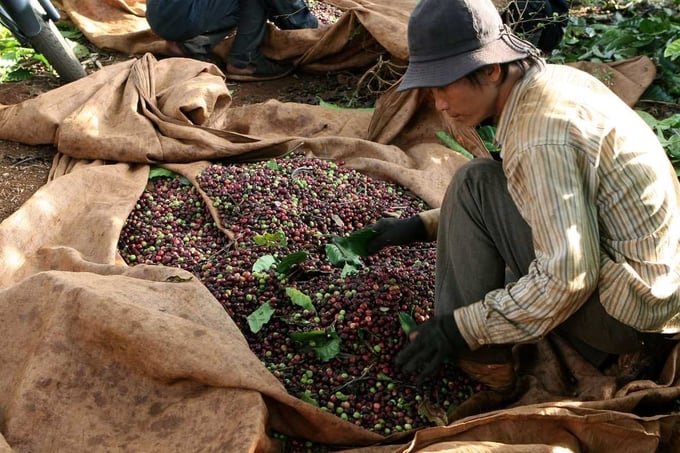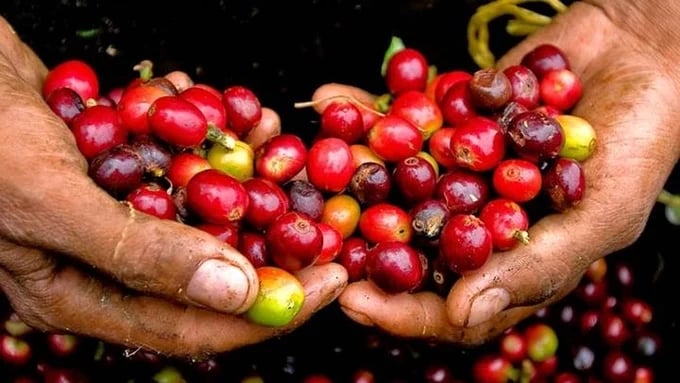November 28, 2025 | 03:57 GMT +7
November 28, 2025 | 03:57 GMT +7
Hotline: 0913.378.918
November 28, 2025 | 03:57 GMT +7
Hotline: 0913.378.918

At the beginning of 2024, the price of coffee has continuously increased both in the domestic and international markets.
According to Document No. 133/SPS-BNNVN from the SPS Office of Vietnam, Mexico requires coffee beans exported to their country to be held at the point of entry into Mexico until a negative quarantine pest report is obtained.
If the result of the quarantine pest diagnosis is negative, the goods may enter the country. If the result of the quarantine pest diagnosis is positive, the importer can choose to either return or destroy the goods.
If live insects are detected during the inspection, a phytosanitary treatment with methyl bromide T302 will be applied.
The modification of regulations for exported coffee beans to Mexico is based on risk assessment by the National Health, Safety, and Agri-Food Quality Service Agency (SENASICA). At the same time, Mexico has removed two phytosanitary measures including the requirement for the product to enter under the detaining, custody and responsibility procedure and the requirement for a phytosanitary diagnosis to be conducted for mycology, bacteriology and weeds.
The Vietnam Coffee-Cocoa Association, businesses, and relevant organizations and individuals have 60 days from March 21 to respond to Mexico's notifications numbered G/SPS/N/MEX/439 and G/SPS/N/MEX/441.
If Vietnam and other countries fail to acknowledge the notice, Mexico will promptly implement the new inspection requirements in accordance with the processes outlined by the World Trade Organization (WTO). Hence, the SPS Office of Vietnam recommends that the Plant Protection Department and the Vietnam Coffee-Cocoa Association conduct a thorough examination and provide information to organizations, enterprises, and people involved in the export of coffee to Mexico.
Feedback on Mexico's draft (if any) should be sent to the SPS Office of Vietnam by May 20 for consolidation and dissemination to WTO members.
Coffee is a prominent agricultural crop that Vietnam exports, particularly due to its consistent placing of price records from the start of 2024. Several analysts predict that the price of coffee might exceed USD 4,000 per ton.
Mexico has a substantial market with significant prospects for Vietnamese agricultural goods, particularly coffee. In addition to seafood, Mexican people have a preference for Vietnamese coffee. Mexicans are among the highest coffee users worldwide, with an estimated consumption of around 1.7 kilograms per individual per year.

The price of coffee in the domestic market today, April 23, has reached 128,000 VND/kg.
Furthermore, it is worth noting that more than 80% of households in Mexico partake in the consumption of instant coffee, which is often derived from Robusta coffee. Robusta coffee is the primary type cultivated in Vietnam, namely in the Central Highlands area.
Vietnamese enterprises benefit advantages from the Comprehensive and Progressive Agreement for Trans-Pacific Partnership (CPTPP) when exporting to Mexico, the 10th most populous country in the world. Mexico has agreed to immediately remove tariffs on 77% of product categories, which accounts for 36.5% of Vietnam's import revenue. Additionally, Mexico will eliminate tariffs on 98% of product categories by the 10th year of CPTPP implementation.
In 2023, Vietnam achieved a record turnover of 4.24 billion USD by exporting over 1.6 million tons of goods. Although the number of exports decreased by 8.7%, the value increased by 4.6% compared to the previous year.
Vietnam's coffee output for the 2023-2024 harvest, as projected by the Vietnam Coffee-Cocoa Association (VICOFA), is expected to range between 1.6 and 1.7 million tonnes. This is a decrease compared to the 1.78 million tonnes produced in the 2022-2023 crop.
Statista forecasts that the coffee industry in Mexico will generate a total income of USD2.7 billion by 2024. The domestic consumption sector, which mostly consists of instant coffee, is expected to contribute around USD1.2 billion to this revenue.
According to OEC statistics in 2022, Vietnam and the United States are the leading coffee exporters to Mexico. Every nation has exported a total value over USD 45 million, which is more than 20% of the total volume of this market.
Aside from Mexico, the SPS Office of Vietnam has also been informed by the UAE, Bahrain, Kuwait, Oman, Qatar, Saudi Arabia, and Yemen about various aspects related to roasted whole coffee beans and ground coffee from the coffea species. These aspects include sampling, testing and analysis methods, packaging, transportation, storage, and labeling.
Translated by Linh Linh

(VAN) On November 27, in the meeting with Minister Tran Duc Thang, Mayor Yin Yong shared Beijing’s experience to improve environment and air quality.

(VAN) After 30 years, both sides identified strategic areas of cooperation: sustainable production, increasing coffee value and training for farmers.
/2025/11/27/4910-4-164708_294.jpg)
(VAN) On the afternoon of November 27 in Beijing, Minister of Agriculture and Environment Tran Duc Thang held a working session with several major Chinese enterprises operating in the agriculture and environment sector.

(VAN) The Department of Animal Health issued a provisional guideline requesting local authorities to increase surveillance, collect samples for testing, and conduct epidemiological investigations according to the established procedure.

(VAN) The United Nations recommends that Vietnam utilize data and artificial intelligence to enhance early disaster warnings and reduce GDP losses by 3.2% in the context of climate change.

(VAN) On the morning of November 27 in Beijing, Minister Tran Duc Thang and the Deputy Commissioner General of the General Administration of Customs of China signed a protocol on fresh jackfruit exports.

(VAN) As floodwaters recede, a vast network of irrigation works across eastern Gia Lai is emerging in a state of severe disrepair, with extensive damage demanding urgent restoration ahead of the 2025-2026 winter-spring cropping season.